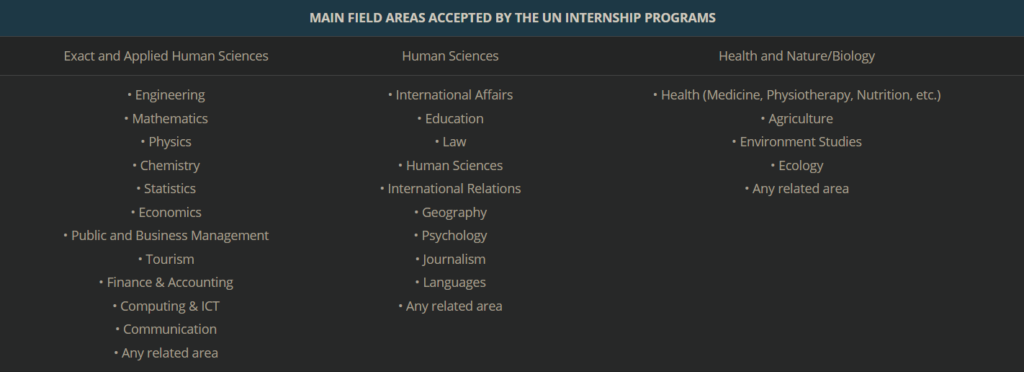When applying for a UN Internship?
Firstly, it should be borne in mind that the intern recruitment and selection process is highly decentralized among the numerous organizations that make up the UN System.
Therefore, the application period, and other details related to a specific vacancy, or internship program, may vary. Generally speaking, there are four most common types of application period for the internship programs: a) applications always open; b) applications open on demand; c) applications by season and d) mixed applications. Further details about each of these will be provided below.
a) Applications always open (rosters)
When UN organizations keep their internship applications permanently open, what they are looking for is establishing a type of applicant database, called an internship roster, where potential applicants are filtered throughout the year. Those who have the profile most in line with the agency’s needs are selected. Rosters are reserve lists composed of pre-assessed and eligible candidates who no longer need to be interviewed to take on a position.
The vacancies offered in this way usually have more generic requirements, which may attract a large number of professionals. Many of these programs establish a validity period of between six months and one year for applications. If applicants are not called within the stipulated timeframe, this means that your applications were not successful.
b) Applications open on demand
There are also UN organizations that open up selection processes for interns only when they identify a need for this. Generally speaking, these vacancies have more specific demands, with regards to requirements and the application process. Therefore, participants should check the opportunities on the respective agency recruitment sites, and search for the vacancies that best fit their profile.
c) Applications open by seasons
There are also UN System internship programs that open their selections at specific times of the year, giving applicants a specific period to apply. This is the case of the World Bank, which offers summer and winter internships. The former is open between December 01 and January 30, while the application period for the winter internship is between October 01 and 31.
OpenIGO offers products and services that focus on the World Bank internship program. To find out more, Click Here!
d) Mixed applications
We should also mention that specific UN System organizations may offer internship opportunities that fit into more than one of these categories. This is the case of the IOM, UNESCO and WTO, which offer vacancies according to demand by their sectors, and they also have an internship program that is open throughout the year. Therefore, you should know the maximum possible about each agency’s specific characteristics, so that you do not miss out on the different opportunities offered.
How to apply for the UN Internships?
Generally speaking, there are three types of application for UN System internships, namely: a) application through internship rosters; b) application for specific vacancies; and c) email application. These application processes have similarities and differences between them, which will be explained below. A common point is that they all require the online submission of the applicant’s supporting documents.
a) Application through internship rosters
As mentioned above, the internship roster is a type of applicant database that remains open to new submissions throughout the year. Usually, the applicants’ documents are available for the recruiters to analyze for up to six months. This type of application is made up of three steps:
- Initial registration on the system: requests basic information to access the site, such as: your name and surname, email address, password, and other general data for identification and contact purposes;
- Completing the personal/professional profile: this stage requires more specific information on your educational background, previous professional experience, language fluency, and other skills acquired;
- Document submission and sending the application: following the previous stage, you may need to send your CV/resume and a cover letter. Some agencies also ask for references/recommendation letters from former employers or professors who have worked with the applicant, and can confirm their competency for the position. Lastly, just submit the application on the system, which will be valid for between six months and one year, in the majority of cases.
b) Applying for specific vacancies
In relation to specific vacancies, the application process differs a little from the previous one. The following steps are required to apply for them:
- Initial registration on the system: usually a basic registration is also required to access the agency’s site, through general contact information and user identification.
- Research specific internship vacancies: you should research and use the agency recruitment site’s filters to find internship vacancies that match your profile.
- Complete the personal/professional profile: after you have found a vacancy that you are interested in, the applicant should complete the personal/professional profile specifically for that vacancy. We emphasize that, in some cases, completing the professional profile is independent of the vacancy; in other words, it may be carried out in advance, and be saved in the user’s account.
- Submit your documents and send the application: as when applying for the internship roster, specific vacancies may require the submission of documents (CV/resume, cover and recommendation letters, among others). After sending them, the applicant will be contacted, if they are selected for interview.
c) Email applications
Lastly, are the email application processes, which are much easier, compared with the previous ones. This is the case of UNRWA – an agency that focuses on the protection of Palestine refugees – in which the interested party should look for the email address of the desired unit (headquarters, field/country or representative offices) and send their CV/resume, a cover letter and, in some cases, a statement that justifies the selection of the agency and indicates which areas of activity they are interested in.
What are the UN Internship Recruitment Platforms?
Many people think that all the UN System internships are advertised on the UN Secretariat careers site, believing that this is the only place that advertises vacancies.
In fact, UN Careers is one of the main sites to advertise internship and job opportunities within the UN System, including various vacancies, not only at the UN Secretariat, but at other agencies (UNEP, UN-Habitat, UNCTAD and UNODC, among others). However, there are various other sites that applicants should also be aware of.
There is the World Bank Group site, and although many people do not know this, this organization also belongs to the United Nations System. The World Bank internship program is valid for three of the Group’s main agencies, namely, IBRD, IDA and MIGA. The other two WBG agencies, IFC and ICSID, have their own intern recruitment site
Another major site is the one of UNDP. It is a transversal site that includes internship and job opportunities in various UN System categories, and sectors of activity. The majority of the internship vacancies available are distributed throughout the UNDP’s different regional and local units of activity. However, the site is also shared between other agencies, funds and departments to advertise internships, such as UN Women, UNCDF and UNOSSC, among others.
What are the documents to submit for the UN Internship Programs?
The application process requires you to submit:
- Curriculum Vitae (CV)/Resume;
- Cover Letter/Statement of Interest
- Proof of enrollment
- Academic transcripts
What is the evaluation criteria for the UN Internship Programs?
Recruiters will seek to identify whether applicants’ academic and professional experience is relevant to the organization’s activities, as well as evaluate their job expectations and level of knowledge about the institution’s work.
With the aim of highly increasing your chances of success in this stage of the UN Internships selection process, OpenIGO Network has put together a thorough Application Review service for candidates, to help you prepare your documents with extreme care and enhance the quality of your application.
Click on the link to find out more:
UN Internships – Application Review








